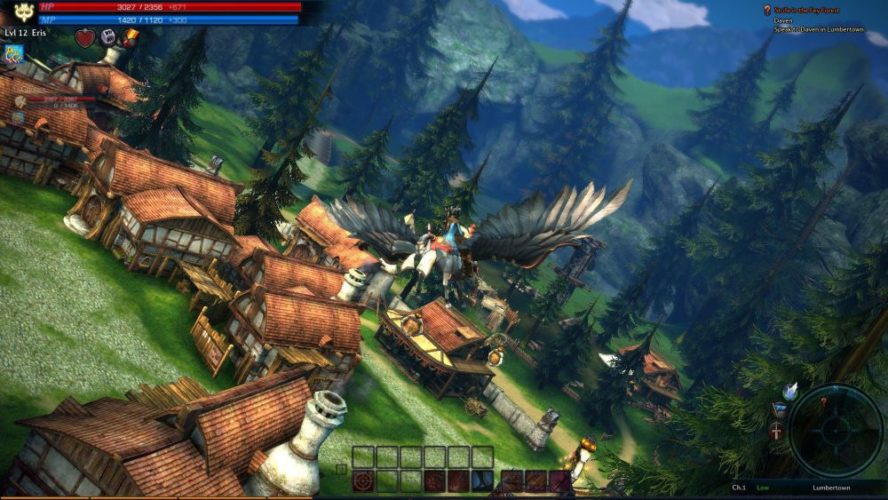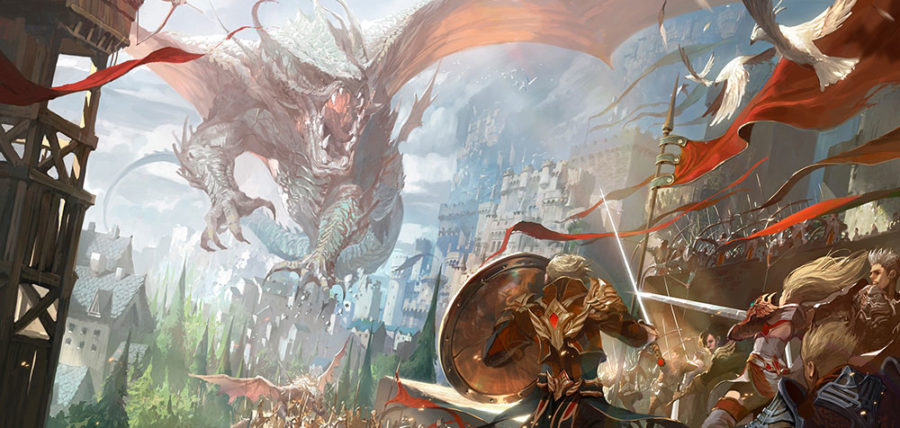MMOs
Titan’s Cancellation and the Future of the MMORPG
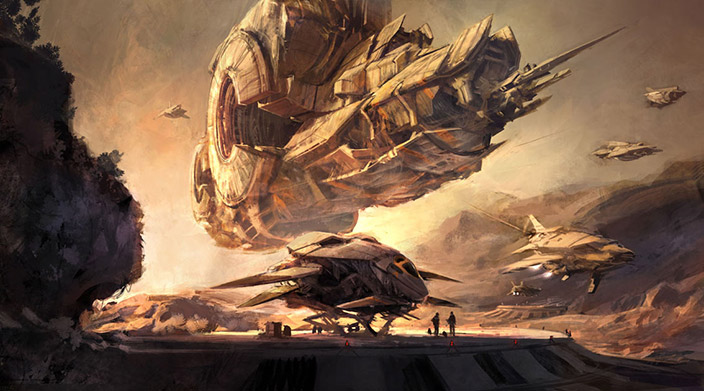
Blizzard shocked the world with the cancellation of Titan, their next-generation MMORPG and poised spiritual successor to World of Warcraft. Seven years into development, and acting on the behavior of the perfectionist, Blizzard decided that Titan simply wasn’t going to be good enough. Where things get interesting is where Blizzard announced that they have no plans for a new MMORPG in the future.
After playing countless MMOs in the past, some good and some bad, they all had one particular running theme: a quick demise and following irrelevance. Outliers exist like the Final Fantasy and Guild Wars titles, but for the most part each and every game released in the genre popularized by Everquest and Blizzard’s own World of Warcraft has died. The more cynical of us believed that who developed the game and the actual product at launch didn’t matter, the only company that could throw Blizzard off of their lonely throne were themselves, either through Titan or killing off their own game once enough time had passed. Seven years later after the unveiling of Project Titan during the pinnacle of World of Warcraft’s popularity, the game dies where it began with no information given out, it leads one to wonder if Blizzard made any progress on their game at all. Regardless, their unwillingness to create a new MMORPG makes sense with the market being so different than it was ten years ago.
The genre is falling into irrelevance, much like the games designed to challenge Blizzard’s stranglehold on the market. Newer titles for years have had arguably unfair expectations stacked upon them, having to compete with Blizzard’s years of polish and content which proved to be impossible. Very few people don’t remember the time where World of Warcraft first launched, surprising Blizzard themselves with how many flocked to their new game and causing the servers to crash constantly for easily a month after launch. The same people that flocked to this new game gave Blizzard time to perfect the mechanics of their new surprise hit and helped meld it into the legendary powerhouse it is today. The same luxury isn’t given to new games, immediately compared to World of Warcraft and discarded afterwards, typically only two or three months after launch before subscriber numbers begin dwindling rapidly.
Final Fantasy XIV had to be cancelled and re-released in order to maintain a playerbase of any kind after their original game flopped horribly, and is one of the three major MMORPGs in today’s market powered off of their popularity in Asia. Their 2 million player mark still pales in comparison to World of Warcraft ten years later.
The only outlier through these ten years is Arenanet’s Guild Wars 2, which has had 7 million global sales and maintains at least 3.5-4 million active players worldwide. Guild Wars 2 is an interesting case, as the lack of subscriptions makes any active player figures up for speculation. Though through the help of their subscription-less approach to their game it stands as the only title able to achieve relevance without any special exceptions like a re-release, seen with Final Fantasy XIV.
The options for games are about as varied as they were ten years ago, the big three with World of Warcraft, Final Fantasy XIV and Guild Wars 2 will likely continue operating, all three with the potential of capturing popularity, or in Blizzard’s case recapturing what was lost lost over the years. There’s less of a desire for larger publishers to compete with Blizzard like there was years ago, and it certainly looks like the genre will fall into relative obscurity over the next few years, especially with the rise of MOBAs as the next popular genre. Interestingly enough, Blizzard does have one of those in the wings too while their vaporware MMO gets canned. Makes one think, doesn’t it?
Guides
Overwatch Character Heights: Discover the Tallest Heroes in 2024
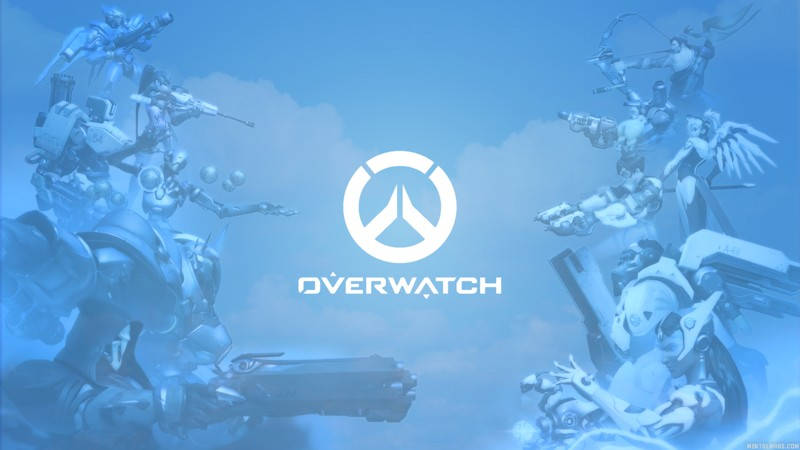
Overwatch has a diverse pool of playable characters from all over the world, but how much do we really know about the height and age of the heroes we face in battle each round?
Overwatch Character Heights

Wrecking Ball (Age: 14, Height: 1’4”, Birth Year: 2062)
Wrecking Ball is a Horizon Lunar Colony product, and genetic therapy transformed him into the smart rodent he is today. His mech, on the other hand, looks significantly more like D.va. Despite these similarities, Hammond has many distinguishing characteristics, the most notable of which is his ability to swing and roll with incredible speed and effectiveness.
When not causing havoc with his mechanical wrecking ball, he works as a mechanic, constructing and fixing machines.
Want to play Overwatch across different consoles? Read our PS4, Xbox, and PC Cross-Play Guide for all the details!
Baptiste (Age: 36, Height: 6’1”, Birth Year: 2031)
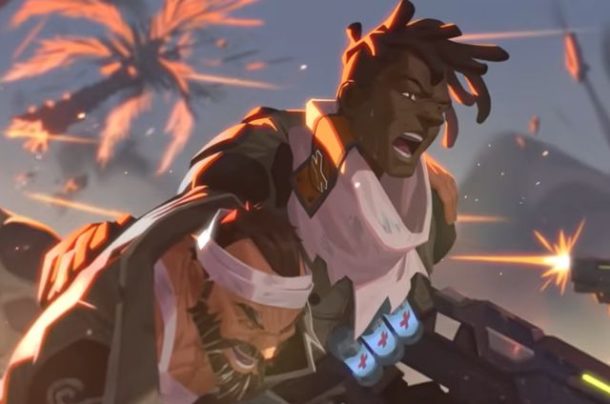
It’s not surprising that this flexible healer thrived on adapting and surviving as a child. After all, he was born at a period of instability, poverty, and political struggle in which the Omnics were engaged in open warfare.
To get by during this turbulent period, Baptiste turned to assisting Talon in illegal activity. However, his conscience soon overcame him, and he chose to flee to Haiti. He’d use his offensive and defensive abilities, as well as his healing blasts, for the greater good while seeking redemption from Talon.
Ana (Age: 60, Height: 6′, Birth Year: 2016)

This Egyptian sniper is Overwatch’s resident mother and one of the group’s founders. Egypt had been crushed and decimated during the Omnic Crisis, creating an opportunity for the clever, resourceful marksmen to flourish in battle.
She later rose to the rank of second-in-command to Strike Commander Morrison (Soldier 76), and she remained on active duty into her 50s. Her age, the loss of an eye, and the disbandment of Overwatch did not deter her from fighting.
Tracer (Age: 26, Height: 5’4”, Birth Year: 2050)
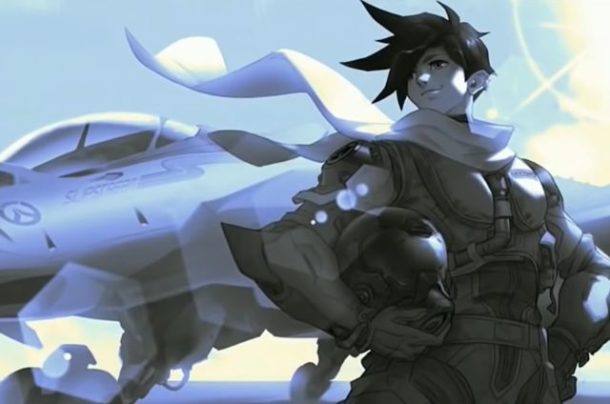
Despite being one of Overwatch’s younger characters, Tracer is a prominent figure, with his image appearing on the game’s cover. There’s a reason for this: she’s played an important role in numerous events leading up to the game and has continuously acted as a force for good. She’s also popular among highly mechanical players and has a high potential in competitive play.
This agile agent excels in her lightning speed and ability to go through time itself.
Torbjorn (Age: 57, Height: 4’7”, Birth Year: 2019)

While he may be little in appearance, he is tall in pride and engineering ability. When it comes to machinery, the seasoned hero is a little out of touch. He prefers steampunk-style technology and turrets while distrusting Omnics and sentient AI.
Torbjorn’s engineering abilities made him an important component in conquering the Omnic Crisis. Unfortunately for the bearded Swede, the fall of Overwatch resulted in the loss and theft of several of his unique weapons.
Discover the top Online Games You Can Play to Earn Cryptocurrencies and start making money while having fun!
Symmetra (Age: 28, Height: 5’7”, Birth Year: 2044)

As she says while using her Ultimate, “reality bends to my will,” and she isn’t exaggerating. The “Light-Bending Architect” can manipulate particles, project energy, and teleport.
These talents came in helpful in India, when the aftermath of the Omnic Crisis prompted the Vishkar Corporation to hastily construct self-sustaining cities for the displaced.
Sojourn (Age: 50-55, Height: 5’11”, Birth Year: Unknown)

Vivian Chase, often known as Sojourn, is a DPS hero with a diverse collection of skills and weaponry, bolstered by her agility and mobility. This Overwatch stalwart tactician has long prioritized fighting the good fight and assisting those in need over herself.
Sojourn’s vast, battle-hardened history, military upbringing, and cybernetic limbs and eyes have provided her with unshakeable fortitude, allowing her to endure more agony than most humans.
Reaper (Age: 58, Height: 6’1”, Birth Year: 2018)
Even when he was more innocent among the living, this maligned mercenary had a sinister side. As Gabriel Reyes, he undermined and even led a rebellion against Overwatch, serving as a Blackwatch insurgent.
Pharah (Age: 32, Height: 5’11”, Birth Year: 2044)

Pharah joined the Egyptian army at a young age, motivated by the desire to follow in her mother Ana’s footsteps. She quickly progressed through the ranks. Her combat talents, combined with her tenacity and leadership abilities, made her a valuable asset and esteemed soldier.
She was supposed to be a prominent figure in Overwatch before the team disbanded, but instead she became a guard for a research lab beneath the Giza Plateau. She was then outfitted with the cutting-edge Raptora Mark VI fighting suit, which allows for increased agility and fires powerful rockets.
Mei (Age: 31 Biologically, 40 Chronologically, Height: 5’3”, Birth Year: 2036)
Following a last-ditch attempt to be rescued via cryogenics, the scientist emerged as the solitary survivor of this disaster. Naturally, ice became this DPS hero’s preferred weapon and self-healing tool. While she is physically 31 years old, she is actually 40 in terms of chronology, having spent several years cryogenically preserved.
Hanzo (Age: 38, Height: 5’8”, Birth Year: 2038)
This sharpshooting assassin was instrumental in the Shimada clan’s ascent to power, assisting them in establishing a lucrative criminal empire. His exceptional talent with a bow, martial arts, and swordplay make him a deceptively lethal fighter. Not only that, but his tactical expertise and leadership abilities make him a powerful and deadly figure.
Genji (Age: 35, Height: 5’7”, Birth Year: 2041)
This Shimada clan’s youngest son used his ninja training and cyborg skills to become a fast and powerful combatant. While a great warrior, Genji is also a more carefree, rebellious counterpart to his older brother Hanzo. The untimely loss of their father caused instability in his family’s criminal company, as well as growing tensions amongst the brothers.
Bastion (Age: 30, Height: 7’3”, Birth Year: 2046)

Humanity constructed Bastion units to safeguard peace and order. They eventually turned on their creators, becoming agents of war against humans during the Omnic Crisis. Their capacity to transform into assault cannons and self-heal made them lethal weapons in the conflict.
One unique unit had been abandoned and let to rot in the aftermath of the conflict, lying inactive and deactivated. However, a surprise reactivation and a decade in the elements caused this Bastion to go rogue and develop a liking for nature.
Dive into our Top 10 Hottest Game Characters list and see which characters are turning heads in the gaming world!
Conclusion
Overwatch characters’ heights vary widely, reflecting their various backgrounds and dispositions. From towering tanks like Reinhardt and Orisa to smaller, more agile heroes like Tracer and Genji, their physical sizes influence their overall character design. Understanding their heights not only sheds light on their visual identities, but also increases our understanding for how these heroes and villains come to life in the Overwatch universe.
Guides
Free Fire vs PUBG: Comparing Graphics, Gameplay, and More
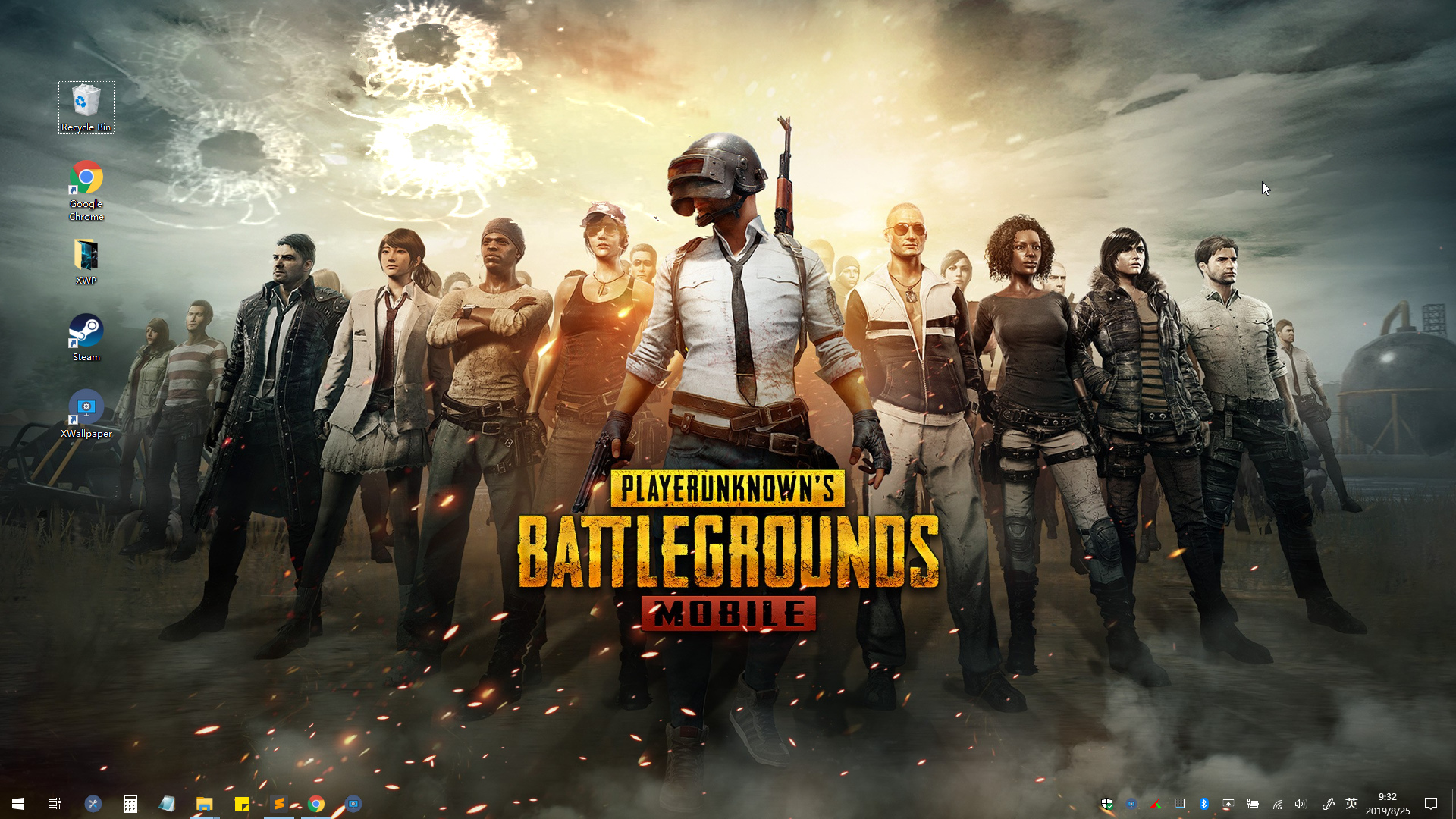
Mobile gaming has taken off recently, with battle royale games at the forefront. Among the top games are Free Fire and PUBG Mobile, each offering unique experiences. Let’s break down their differences in graphics, gameplay, performance, and other aspects to help you decide which suits your style.
Key points:
- Free Fire offers quick, action-packed matches with simpler graphics and is optimized for low-end devices, making it accessible to a wider audience.
- PUBG Mobile provides a more immersive experience with realistic graphics, larger maps, and strategic gameplay, appealing to players who prefer longer and more tactical matches.
- While Free Fire focuses on character abilities and fast-paced gameplay, PUBG Mobile shows skill and strategy with its focus on fair play through cosmetic-only upgrades.
Key Differences Between Free Fire and PUBG Mobile

When comparing Free Fire and PUBG Mobile, both offer unique experiences in the battle royale genre. Let’s explore the key differences between these two popular games across graphics, gameplay, performance, and more.
Looking for a good time? Check out our list of Exciting Online Games That Guarantee Fun and start playing today!
1. Graphics: Realistic vs. Simple

Graphics play a significant role in how players experience a game. Here’s how Free Fire and PUBG Mobile compare visually:
- Free Fire: Free Fire has a more cartoonish and simplified visual style. The colors are bright, and the graphics are less realistic, making the game run smoothly on most smartphones, even low-end devices.
- PUBG Mobile: PUBG Mobile takes a different approach, focusing on realism. Powered by Unreal Engine 4, it offers detailed environments, lifelike characters, and a more immersive world. However, this level of detail requires more powerful smartphones to run smoothly.
If you prefer realistic graphics and have a high-end device, PUBG Mobile is the better choice. For those with budget devices or a preference for simpler visuals, Free Fire works well.
2. Gameplay: Quick Action vs. Tactical Depth
Both games follow the battle royale format, but their gameplay differs in pacing and strategy.
- Free Fire: Free Fire is fast-paced. Each match lasts around 10 minutes and includes 50 players, which means more immediate action. It’s easy to pick up and play, with straightforward controls and mechanics. The addition of characters with unique abilities adds an extra layer of strategy.
- PUBG Mobile: PUBG Mobile is slower and more tactical. Matches last longer (around 30 minutes), and up to 100 players can join. The larger maps and more complex gun mechanics encourage careful planning and teamwork. It rewards players who think strategically and make use of different playstyles.
If you like fast, action-packed games, Free Fire is perfect. But if you enjoy longer, more strategic battles, PUBG Mobile is the way to go.
3. Device Compatibility and Performance

How well a game runs on your device is crucial, especially for mobile gamers. Here’s how each game performs on different devices:
- Free Fire: Free Fire is optimized for low-end smartphones. It takes up less space and requires fewer resources, making it run smoothly even on older devices. This broad compatibility makes it a popular choice in regions where high-end devices are less common.
- PUBG Mobile: PUBG Mobile is more demanding regarding storage and RAM. It requires better hardware to run smoothly, especially at higher graphics settings. Although there is a lighter version called PUBG Mobile Lite for weaker devices, the full version still demands more power.
If you’re using an older or budget smartphone, Free Fire is a safer option. PUBG Mobile provides a more intense visual experience for those with powerful devices.
4. Map Design and Variety
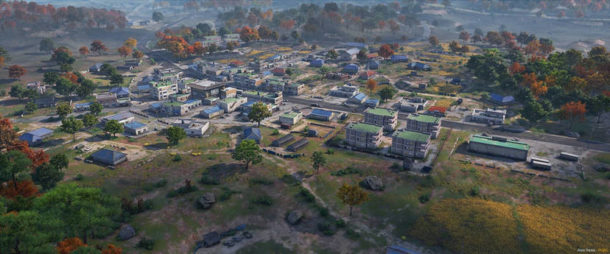
The variety of maps adds to the replay value and the game’s challenge.
- Free Fire: The maps in Free Fire are smaller and designed for quick encounters. With fewer maps to choose from, the focus is on fast action and frequent combat. This suits the game’s short match times and ensures players are always engaged.
- PUBG Mobile: PUBG Mobile offers more map variety, including large open spaces, urban areas, and forests. Each map has a different layout, encouraging different strategies. The larger size of the maps also means players can spend more time exploring and planning their moves.
If you prefer a variety of environments and longer matches, PUBG Mobile excels. Free Fire is better for those who want fast, action-packed rounds with less waiting between battles.
5. Customization and Purchases
Both games offer customization options, but there are differences in how these impact the gameplay.
- Free Fire: Free Fire allows players to unlock characters with unique abilities, which can affect how the game is played. Players can use in-game currency or real money to unlock these abilities. Cosmetics like skins and outfits are also available but don’t impact gameplay.
- PUBG Mobile: In PUBG Mobile, customization is primarily limited to cosmetics, such as skins, outfits, and weapon designs. These items don’t affect the gameplay, so the focus remains on skill and strategy.
If you enjoy unlocking characters with unique abilities, Free Fire offers more gameplay diversity. If you prefer a game where cosmetics don’t affect performance, PUBG Mobile is a fairer option.
Stay updated with the best in gaming! Check out our list of the Top 10 Gaming Pages to Follow on Instagram right now for the latest news and trends!
Conclusion
Free Fire and PUBG Mobile are top-tier battle royale games that cater to different audiences. Free Fire is ideal for players who prefer short, action-filled matches and need a game that runs well on low-end devices. Its simple controls and character abilities make it easy for casual gamers to enjoy.
On the other hand, PUBG Mobile offers a more immersive and strategic experience. With realistic graphics, larger maps, and more tactical gameplay, it’s best suited for players who enjoy longer matches and have higher-end devices.
Ultimately, the best game depends on your personal preferences and the device you’re using. Both games deliver exciting battle royale experiences in their unique ways.
MMOs
Top 15 Famous Minecraft YouTubers You Should Watch in 2024

Minecraft is one of the most popular games in the world, and its community is filled with talented content creators who keep players entertained and informed. In 2024, several YouTubers continue to lead the charge with their creativity, skills, and engaging content. Whether you’re looking for building tips, survival challenges, or just some laughs, here are 15 famous Minecraft YouTubers you should watch this year.
Top 15 Minecraft YouTubers Dominating the Scene in 2024
Minecraft’s vibrant community continues to grow, with YouTubers playing a key role in shaping the game’s culture. Here are 15 of the most famous Minecraft YouTubers you should follow in 2024 for exciting gameplay, creative builds, and epic challenges.
1. Mikecrack – 47M Subscribers

Mikecrack, a Spanish-speaking YouTuber, is among the most popular Minecraft creators globally. His content primarily consists of Minecraft roleplays, mini-games, and challenges that keep his audience engaged. Mikecrack’s funny, energetic style has earned him a massive following, making him one of the top Minecraft creators in the world.
2. Dream – 32M Subscribers
Dream is known for his intense Minecraft search series, where he attempts to speedrun the game while being hunted by other players. His exceptional Minecraft skills and strategic thinking have made him one of the biggest names in the community. Dream’s manhunts and SMP (Survival Multiplayer) server content remain fan favorites in 2024.
3. MrBeast Gaming – 43M Subscribers

While primarily known for his main channel, MrBeast’s gaming content, mainly Minecraft, has gained a significant following. On his MrBeast Gaming channel, he takes on various Minecraft challenges, often with high stakes and fun twists. His over-the-top ideas and large-scale collaborations continue to capture viewers’ attention.
Also Read: Download Mods for Minecraft 1.20.0 and 1.20 for Android
4. DanTDM – 28M Subscribers
DanTDM has been a Minecraft YouTube legend for years. His family-friendly content, including Minecraft Let’s Plays, mod showcases, and adventures, will remain popular in 2024. DanTDM’s long-standing influence on the Minecraft community makes him a must-watch for fans of all ages.
5. ElTrollino – 21M Subscribers
ElTrollino, another Spanish-speaking YouTuber, is well-known for his Minecraft challenges, roleplay, and mini-game content. His comedic style and creative approach to Minecraft have earned him a large and loyal audience. ElTrollino’s videos are full of laughter and entertainment, making him a favorite among younger viewers.
6. SSundee – 23M Subscribers
SSundee is a long-standing Minecraft YouTuber known for his diverse range of content. From modded Minecraft series to intricate challenges and collaborations, SSundee offers something for everyone. His engaging personality and variety of game modes keep viewers coming back for more.
7. PopularMMOs – 17M Subscribers
PopularMMOs is well-known for his Minecraft mob battles, where he puts different Minecraft creatures against each other in combat. Over the years, he has expanded into various other content, including adventure maps and mini-games. PopularMMOs’ entertaining commentary and creative concepts have made him a staple in the Minecraft YouTube community.
8. Robin Hood Gamer – 20M Subscribers

Robin Hood Gamer is another major player in the Minecraft YouTube scene, especially among Portuguese-speaking audiences. He focuses on Minecraft adventures, challenges, and mini-games that appeal to a broad demographic. His charisma and exciting gameplay have earned him millions of loyal fans.
9. TazerCraft – 15M Subscribers
TazerCraft, made up of a duo of Brazilian Minecraft YouTubers, creates engaging Minecraft roleplay and challenging content. Their chemistry and ability to entertain viewers through various Minecraft adventures have garnered them a huge following, particularly in the Portuguese-speaking Minecraft community.
10. EdisonPts – 15M Subscribers
EdisonPts is known for his creative and often humorous Minecraft gameplay. His channel features a mix of mini-games, survival challenges, and collaborative content with other YouTubers. EdisonPts’ witty commentary and fun challenges keep his audience engaged and entertained.
11. Stampylonghead – 11M Subscribers

Stampylonghead (also known as Stampy) has been a beloved figure in the Minecraft YouTube world for years. His child-friendly content, especially his “Lovely World” series, has earned him a loyal following among younger audiences. Stampy’s cheerful approach to Minecraft makes him an excellent choice for players of all ages.
12. Sky Does Everything – 11M Subscribers
Formerly known as SkyDoesMinecraft, Sky Does Everything is a YouTuber known for his unique humor and engaging Minecraft content. Over the years, his channel has evolved to include more variety, but his roots in Minecraft are still a big part of his channel’s identity. His Minecraft gameplay, roleplay, and challenges remain popular in 2024.
Looking to upgrade your Minecraft world? Check out our 11 Best Minecraft Dock Ideas for creative and functional designs to enhance your builds!
13. JP Plays – 11M Subscribers
JP Plays is a Brazilian YouTuber who has gained popularity for his Minecraft content, primarily aimed at younger viewers. His videos often feature fun challenges, adventure maps, and roleplay, providing a mix of humor and creativity that resonates with his audience.
14. Minecraft – 13M Subscribers
The official Minecraft YouTube channel is a treasure trove for fans of the game. It features updates on new content, behind-the-scenes looks at Minecraft’s development, and collaborations with other creators. In 2024, the channel will continue to serve as an essential hub for everything related to the game.
15. Jazzghost – 15M Subscribers
Jazzghost is another popular Portuguese-speaking Minecraft YouTuber who has built a large following with his entertaining and creative videos. His content is often lighthearted and humorous, making it a favorite among Minecraft fans looking for a fun and relaxed viewing experience.
Want to add a splash to your Minecraft world? Explore our 10 Best Minecraft Fountain Design Ideas for inspiration to create stunning and unique fountains!
Conclusion
These 15 Minecraft YouTubers have captured the attention of millions of fans worldwide, each bringing something unique to the table. Whether you’re looking for intense challenges, creative building, or hilarious roleplay, these famous Minecraft YouTubers offer endless entertainment in 2024. With their massive subscriber bases and engaging content, they continue to shape the Minecraft community and inspire new generations of players.
-

 Guides5 years ago
Guides5 years ago6 Proven Ways to Get more Instagram Likes on your Business Account
-

 Mainstream10 years ago
Mainstream10 years agoBioWare: Mass Effect 4 to Benefit From Dropping Last-Gen, Will Not Share Template With Dragon Age: Inquisition
-

 Mainstream6 years ago
Mainstream6 years agoHow to Buy Property & Safe Houses in GTA 5 (Grand Theft Auto 5)
-

 Casual2 years ago
Casual2 years ago8 Ways to Fix Over-Extrusion and Under-Extrusion in 3D Printing
-

 Mainstream12 years ago
Mainstream12 years agoGuild Wars 2: The eSports Dream and the sPvP Tragedy
-

 Guides10 months ago
Guides10 months agoFree Fire vs PUBG: Comparing Graphics, Gameplay, and More
-

 iOS Games2 years ago
iOS Games2 years agoThe Best Basketball Games for IOS
-

 Gaming News1 year ago
Gaming News1 year agoSwiping, Tapping, and Tilting: How Mobile Games Are Played Today



